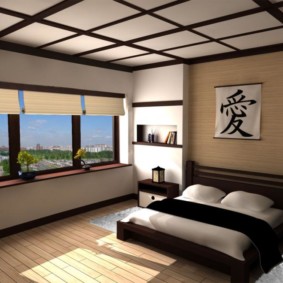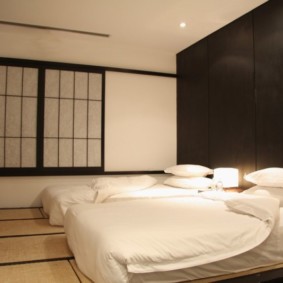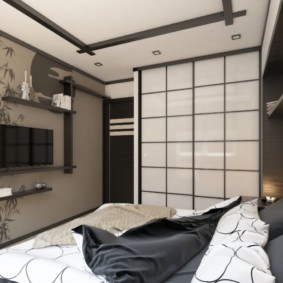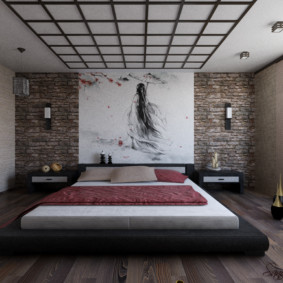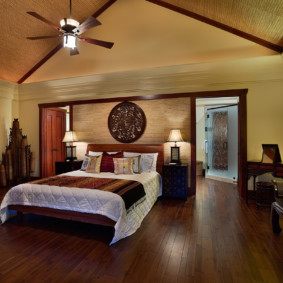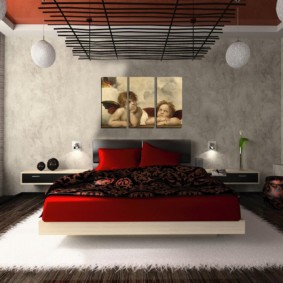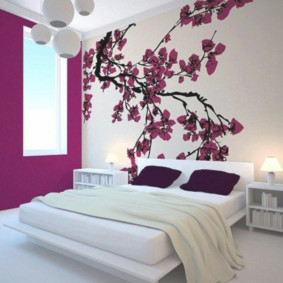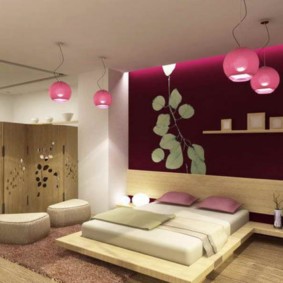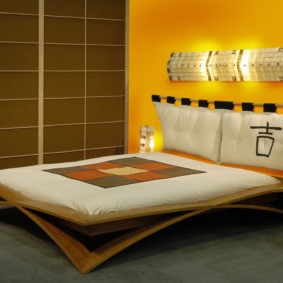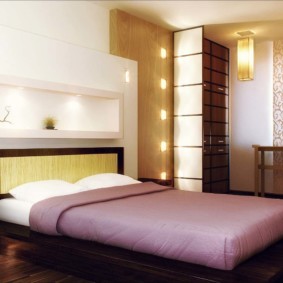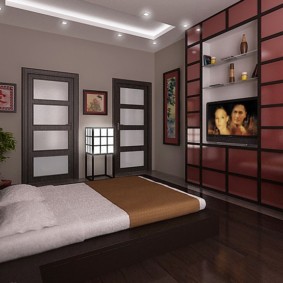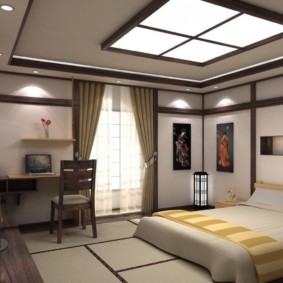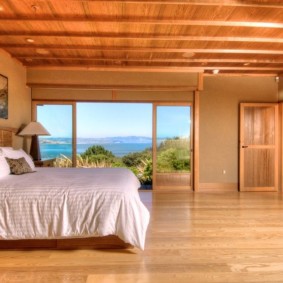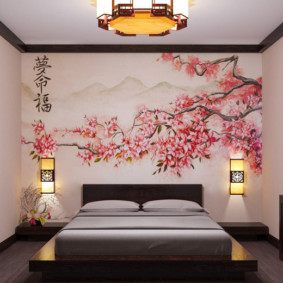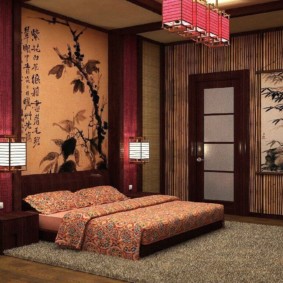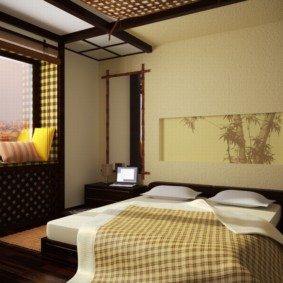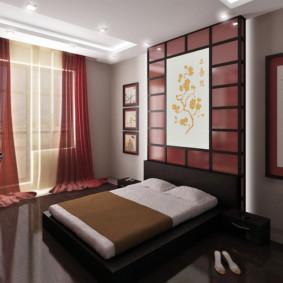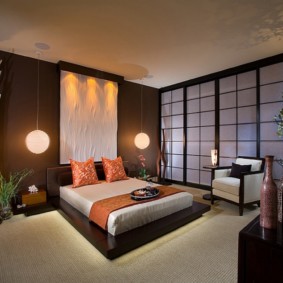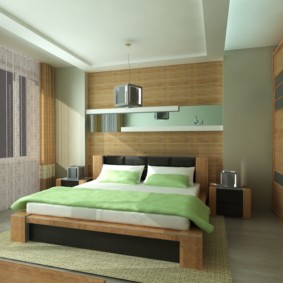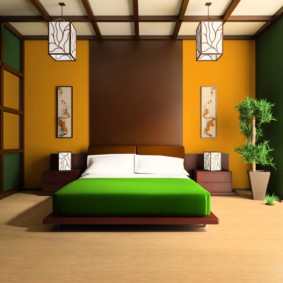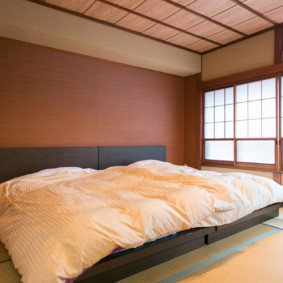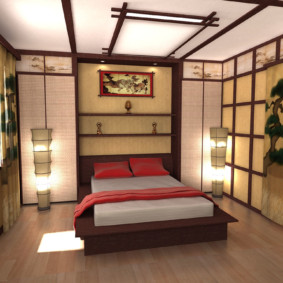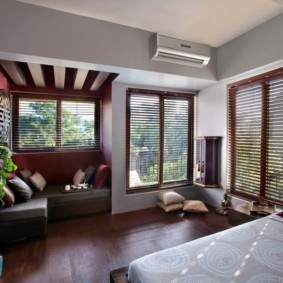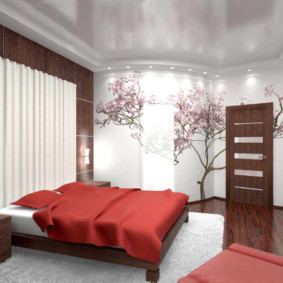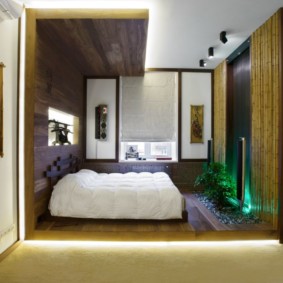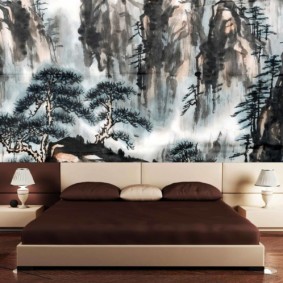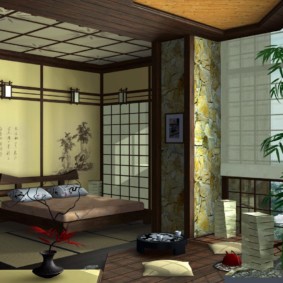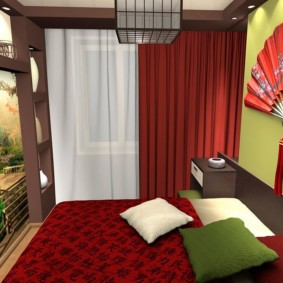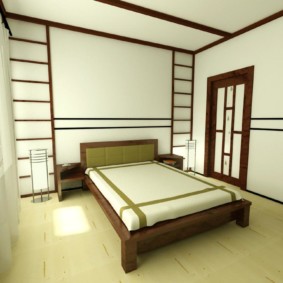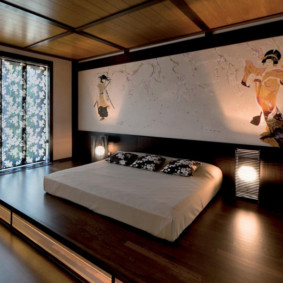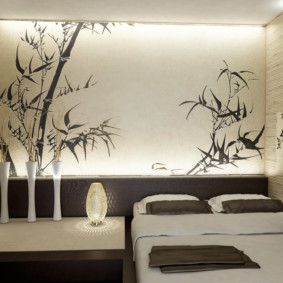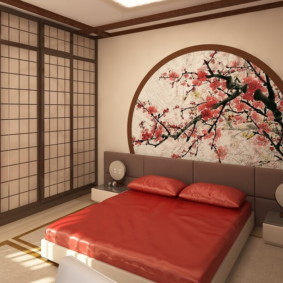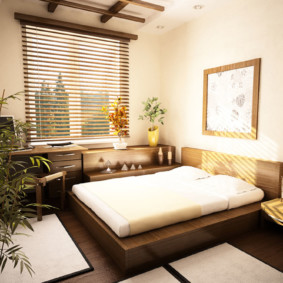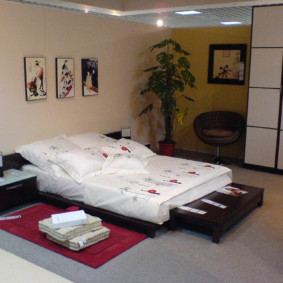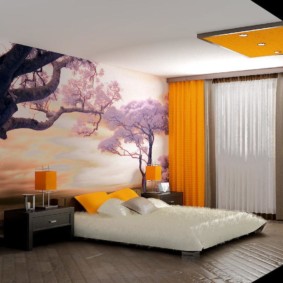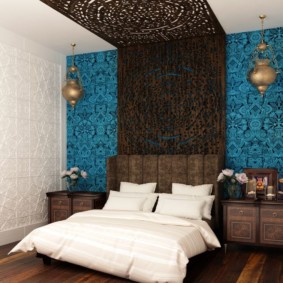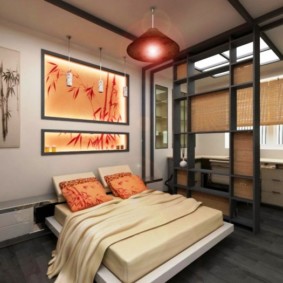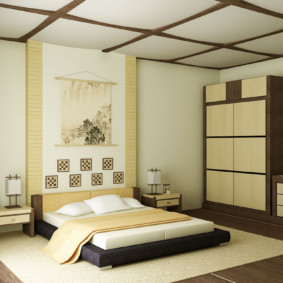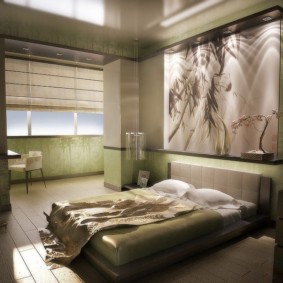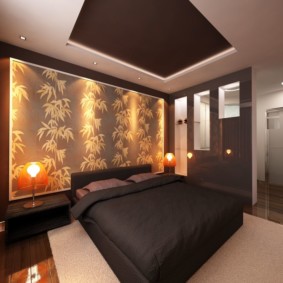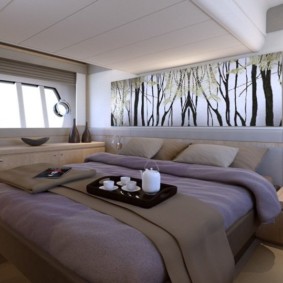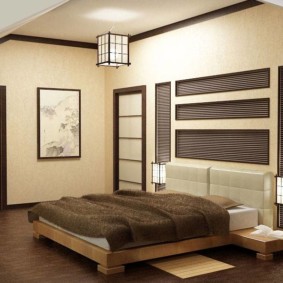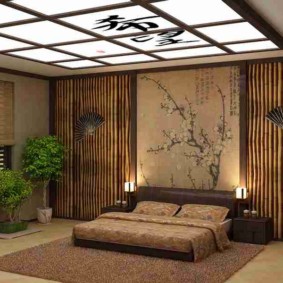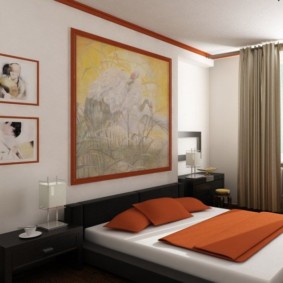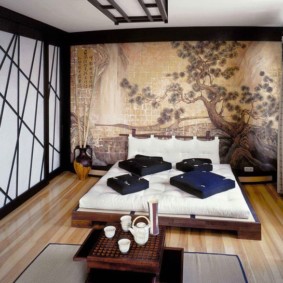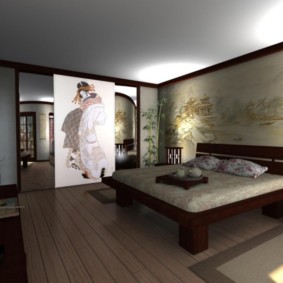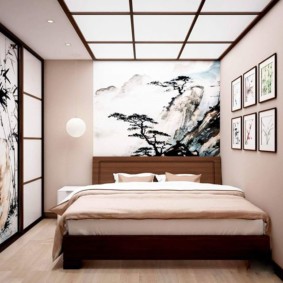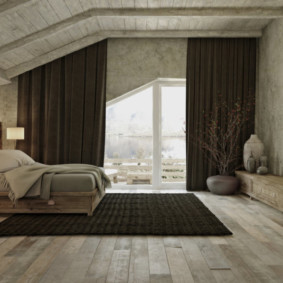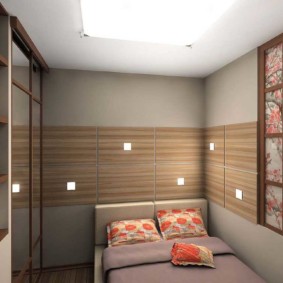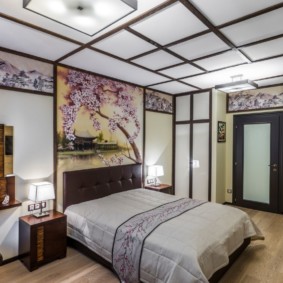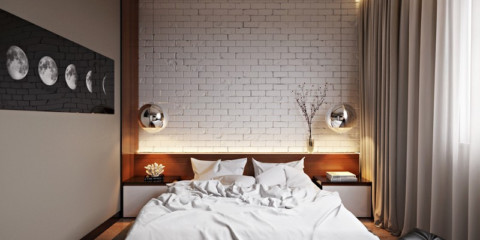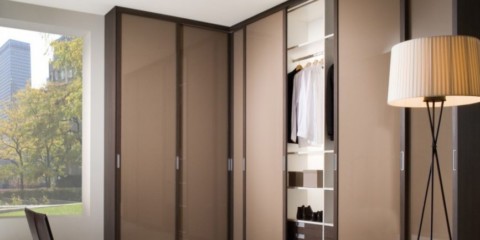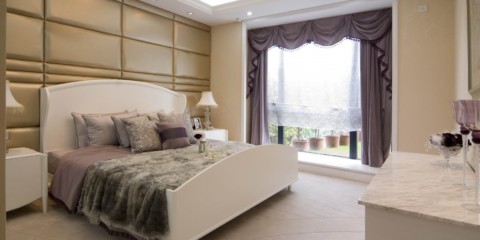 Bedroom
Design options for the bedroom in an apartment and a private house
Bedroom
Design options for the bedroom in an apartment and a private house
If you want to design a bedroom in a special way, combining home decoration and non-trivial decor, then the Japanese style is definitely your story. According to the Japanese, convenience and proximity to nature should be at the forefront. And the bedroom is not just a place to relax, but a room with a special philosophical meaning.
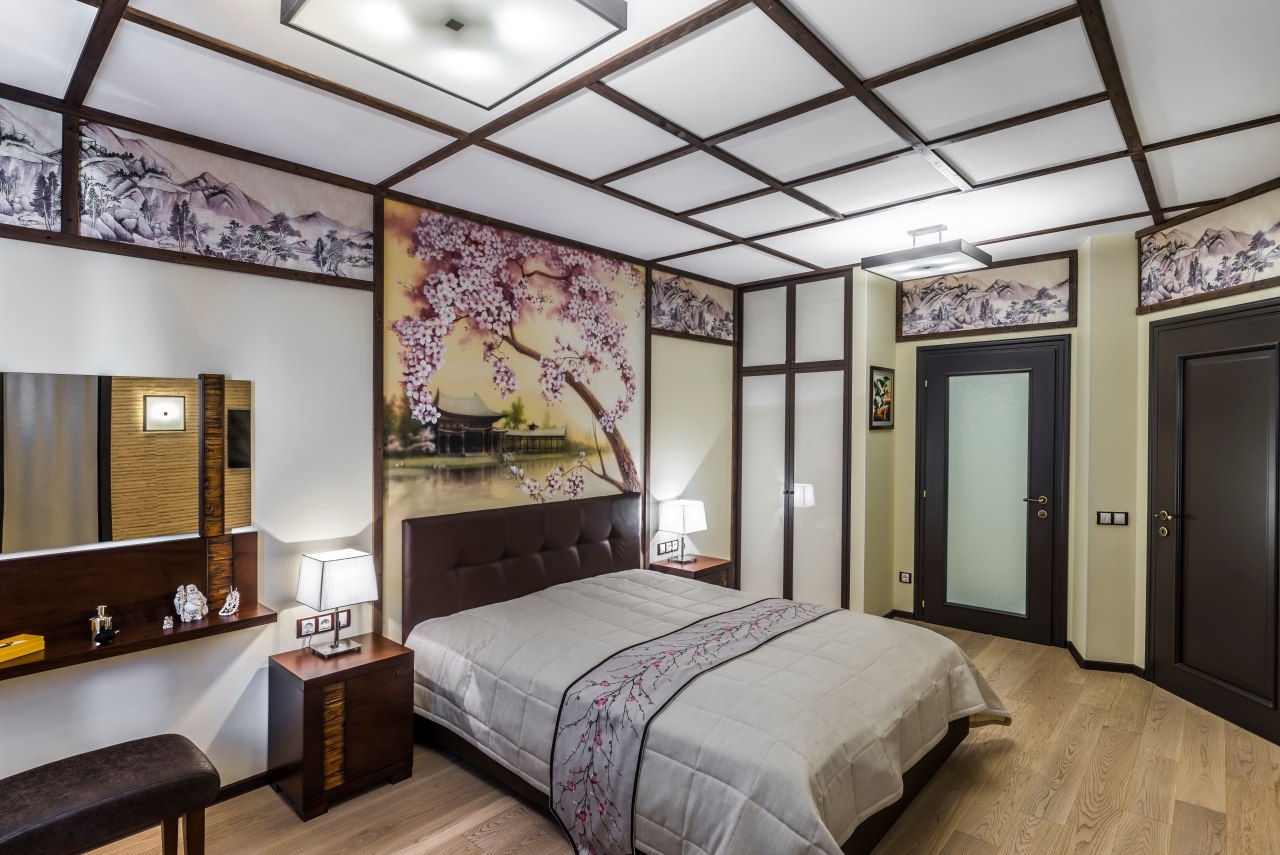
To nicely equip a room is not an easy task.
Interior Features
Content
Any room in the Japanese style is exclusively natural finishing materials. The interior has wood and fabrics. The Japanese are not supporters of bright colors and rooms with many additional elements (carpets or decor). According to Japanese philosophy, the less things there are, the less fuss. And restraint and simplicity contribute to spiritual harmony.
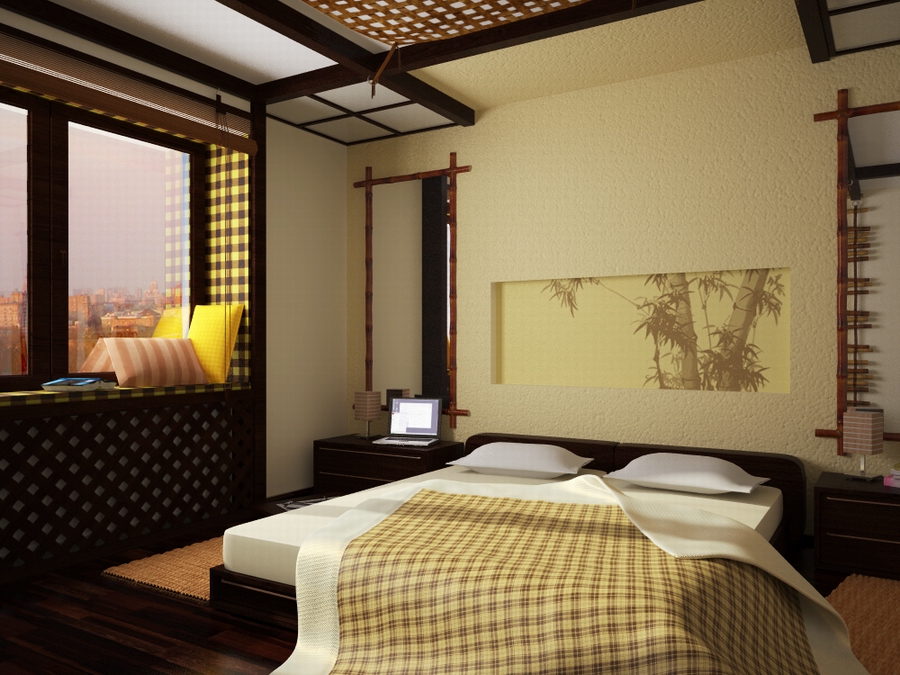
You need to choose the right furniture, accessories, decor, consider different finishes.
Interesting fact: only a third of the territory of Japan is favorable for life. And the overwhelming part of space is the harsh natural conditions in which one had to survive. Add to this the constant natural disasters, such as typhoons and tsunamis, and you will understand why the Japanese preferred lightweight prefabricated houses to fundamental buildings. All this could not but affect the traditional Japanese design.
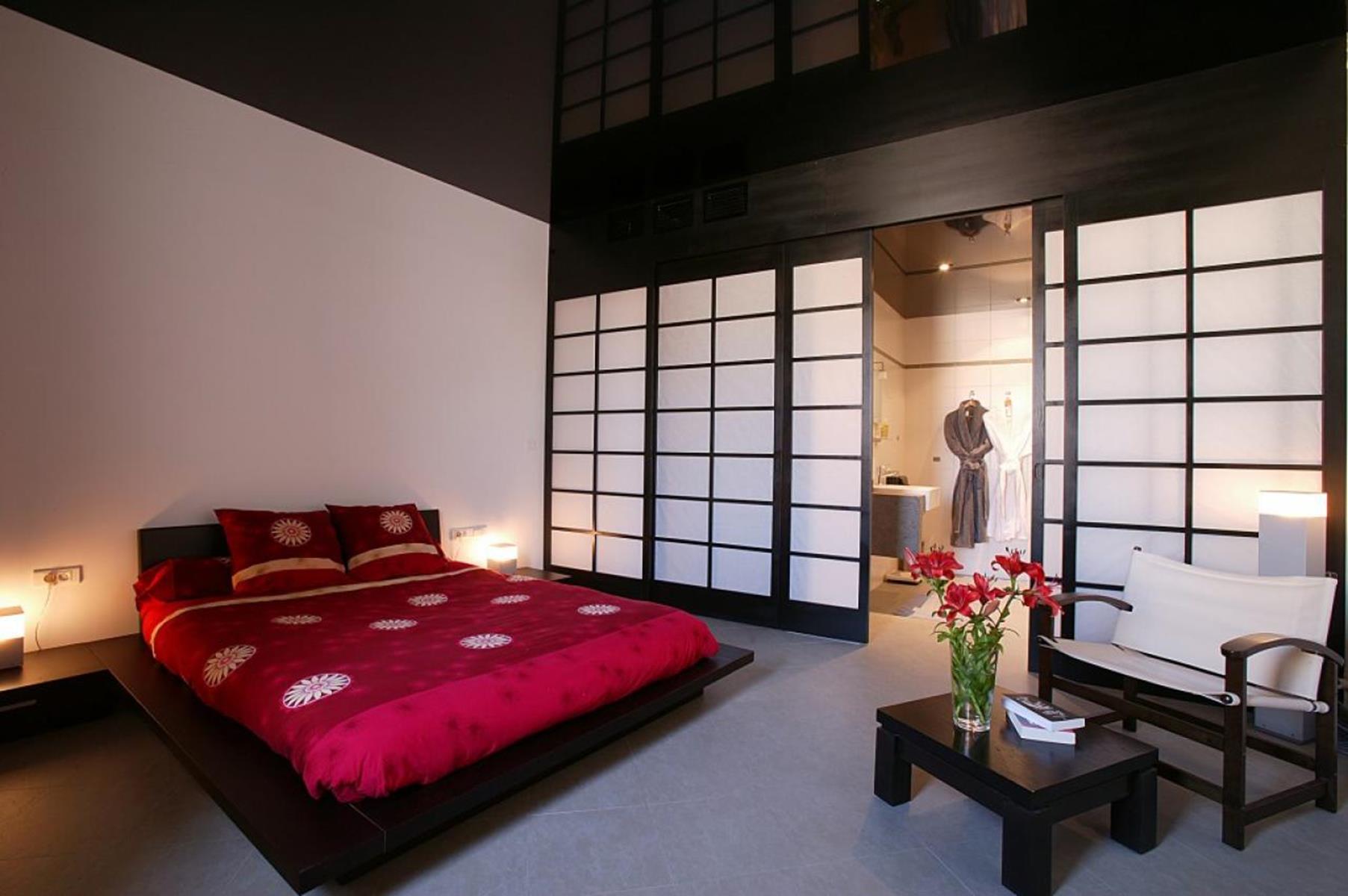
All this should be beautifully combined with each other, and the room itself should be functional, comfortable and aesthetically attractive.
In fact, the Japanese style is based on three postulates.
- Minimalism. If there are no extra items in the room, then there is no extra worries about them.
- Naturalness. This helps to become closer to nature, to feel like a part of it.
- Rationality. The space should be as functional as possible, and built-in furniture, sliding wardrobes or convertible furniture helps to achieve this.
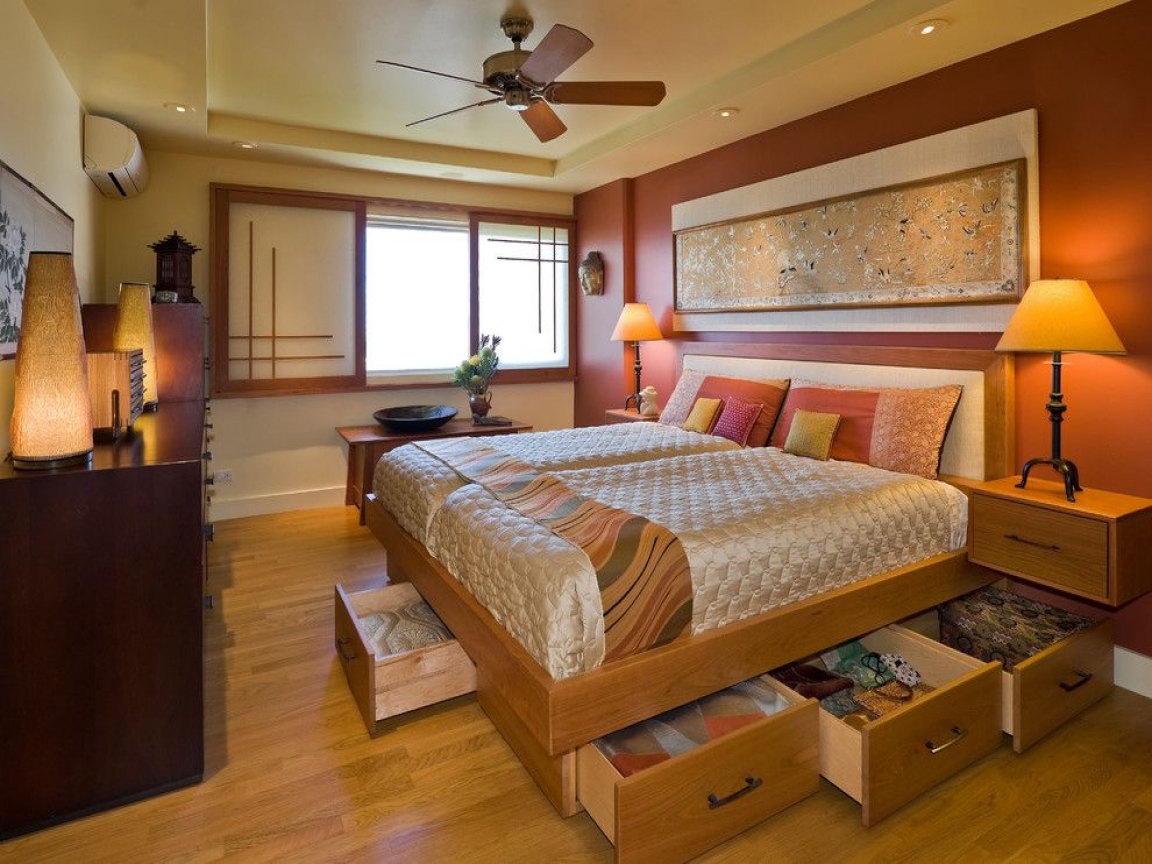
This direction is the best suited for bedroom decoration.
Important! The Japanese style is ideal for spacious rooms. But professional designers successfully recreate it in limited spaces.
Color scheme
So, creating a Japanese design, remember that the space should be arranged so that the eyes and thoughts rest. This is true with regard to color schemes. The predominant colors are beige, cream, white, black, and gray. There is no place for aggressive shades in such an interior, but bright decorative elements are allowed.
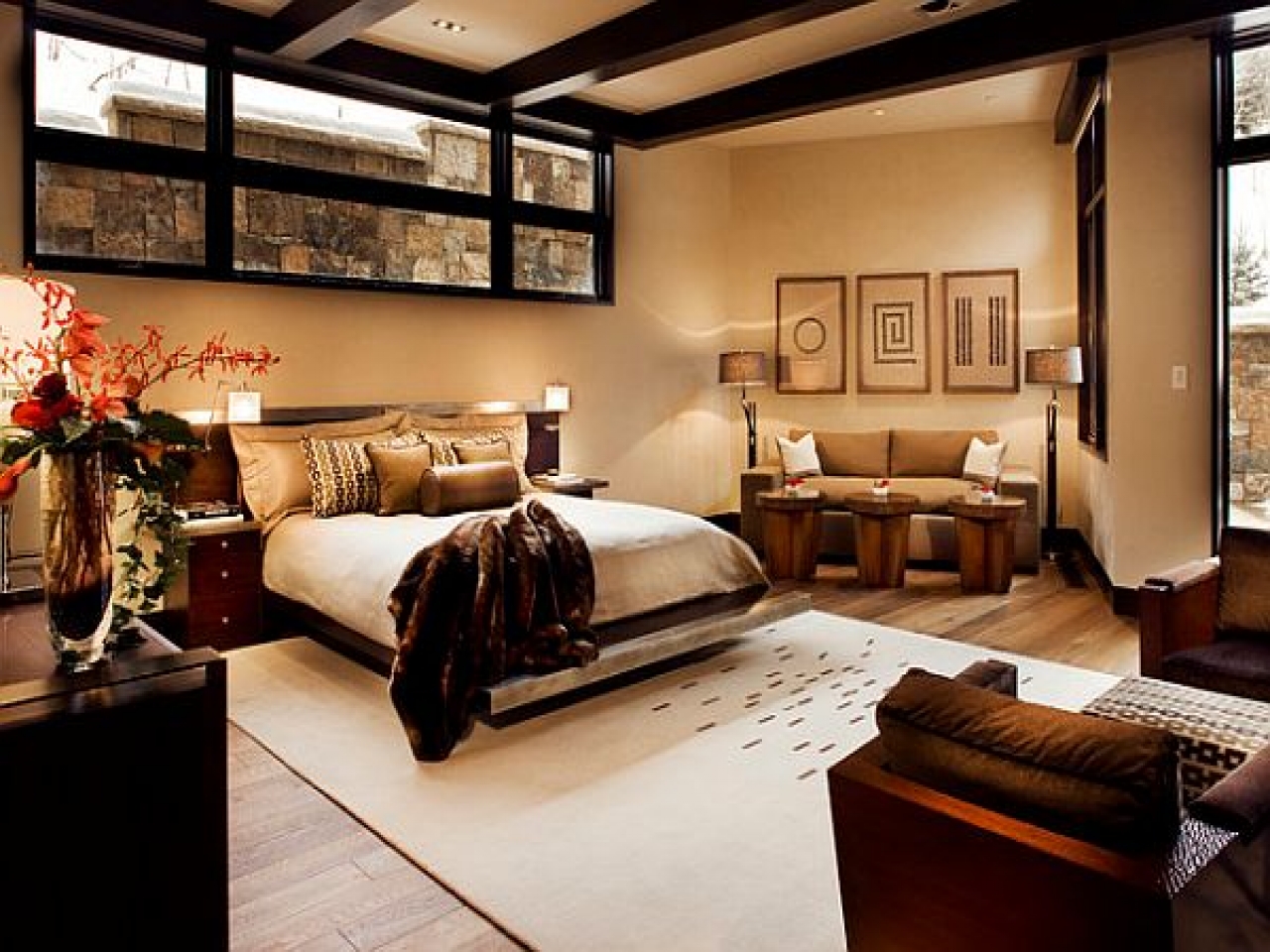
Oriental themes, especially the Japanese style, always seem to be something mysterious, sublime, sophisticated.
It is interesting that the inhabitants of the Land of the Rising Sun prefer somewhat “shabby” colors, hinting at the decent age of the room. Yes, they are true connoisseurs of history.
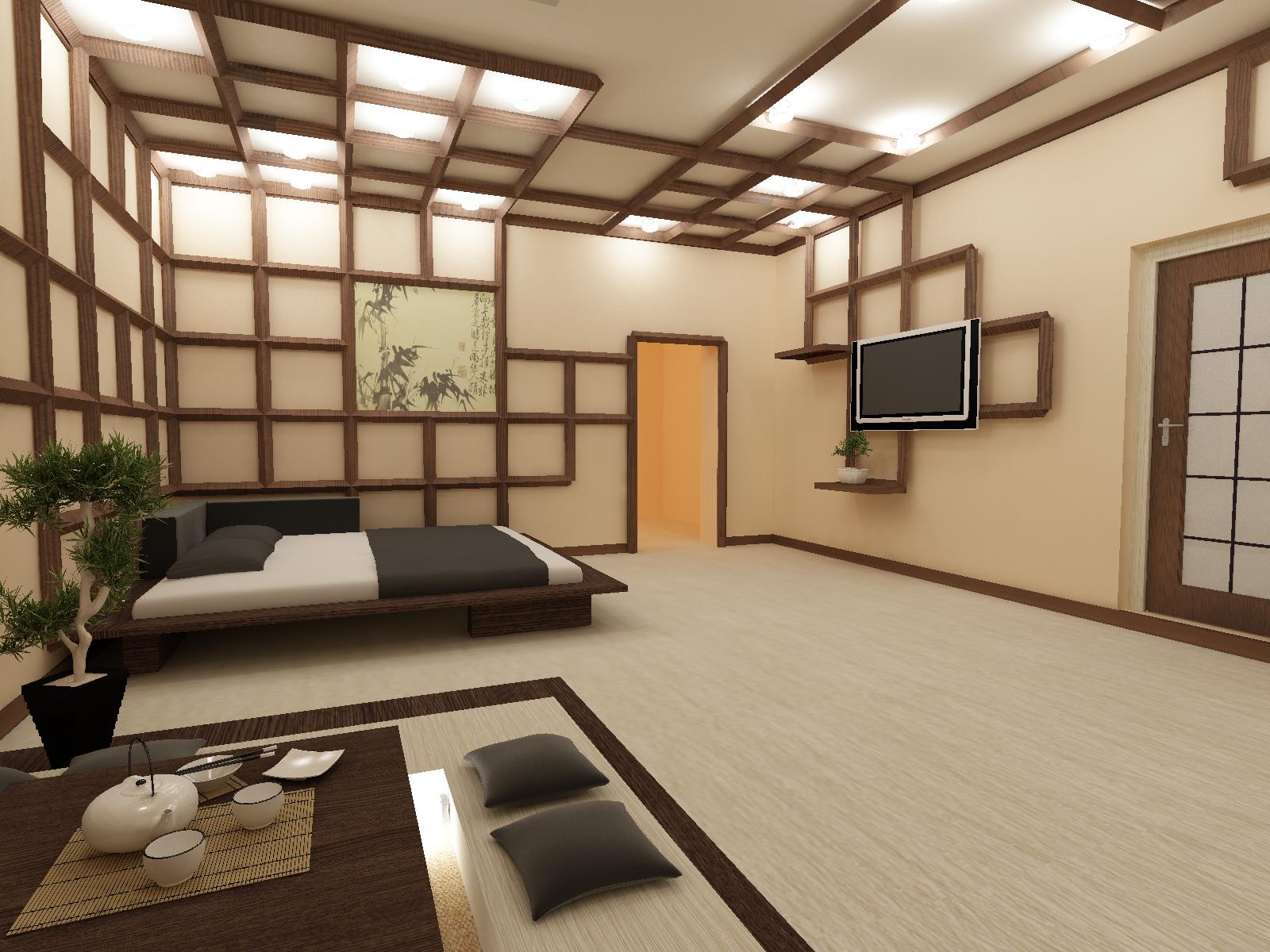
It is possible to briefly outline the main criteria of the Japanese style in almost two words - tradition and minimalism.
Walls
Remember, in a room with an oriental design of the walls, as such, there is simply no. They are replaced by shoji (wooden frame with stretched paper) and screens. By the way, in addition to the practical function, screens successfully cope with the role of a decorative element, diluting the laconic space and adding a little charm to it.
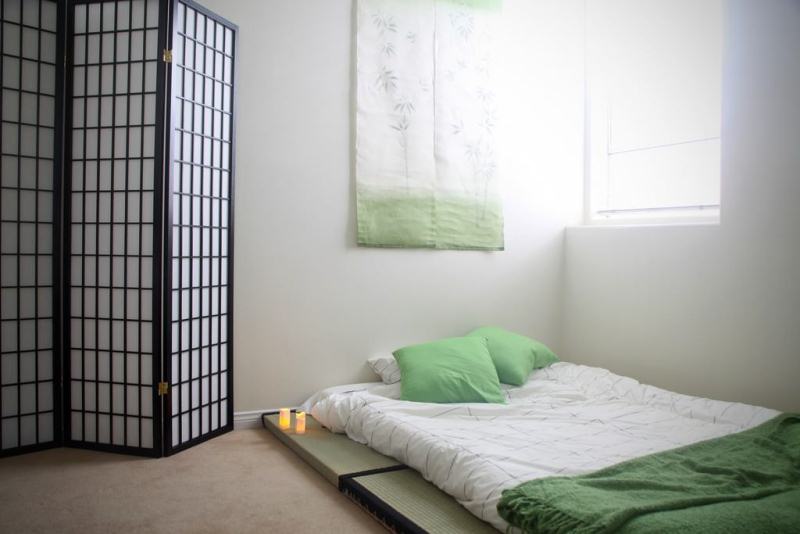
This style is perfect for small-sized apartments, such as "Khrushchev".
Since the common motto of such interiors is naturalness in everything, choose bamboo wallpapers, wood panels, natural textiles or paint as wall decoration.If it is not possible to buy bamboo or wood panels, give preference to a more budgetary option - paper wallpaper with a characteristic pattern, or with images of cranes, sakura and hieroglyphs.
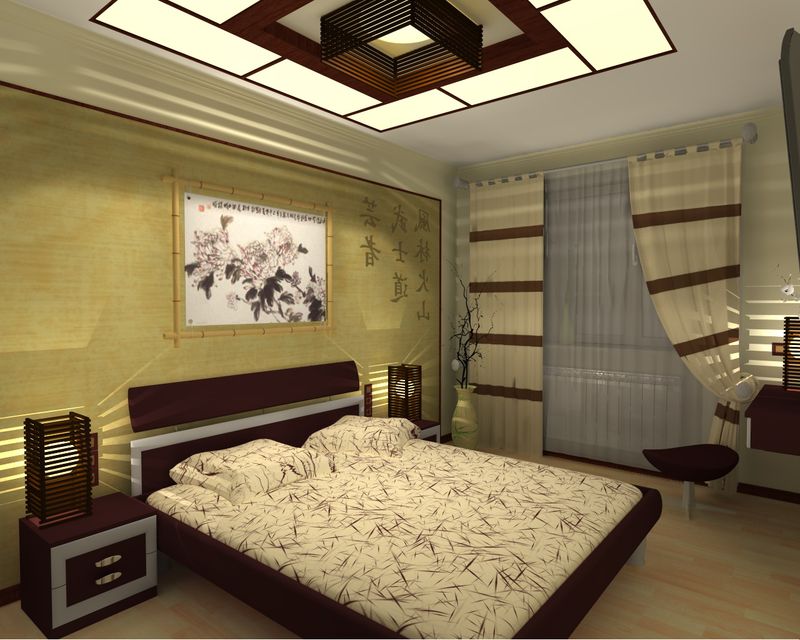
Free space, devoid of a large number of decorative ornaments and accessories.
Walls decorated with textiles such as silk look even more impressive. Of course, such a design decision will be expensive, but the result is simply amazing.
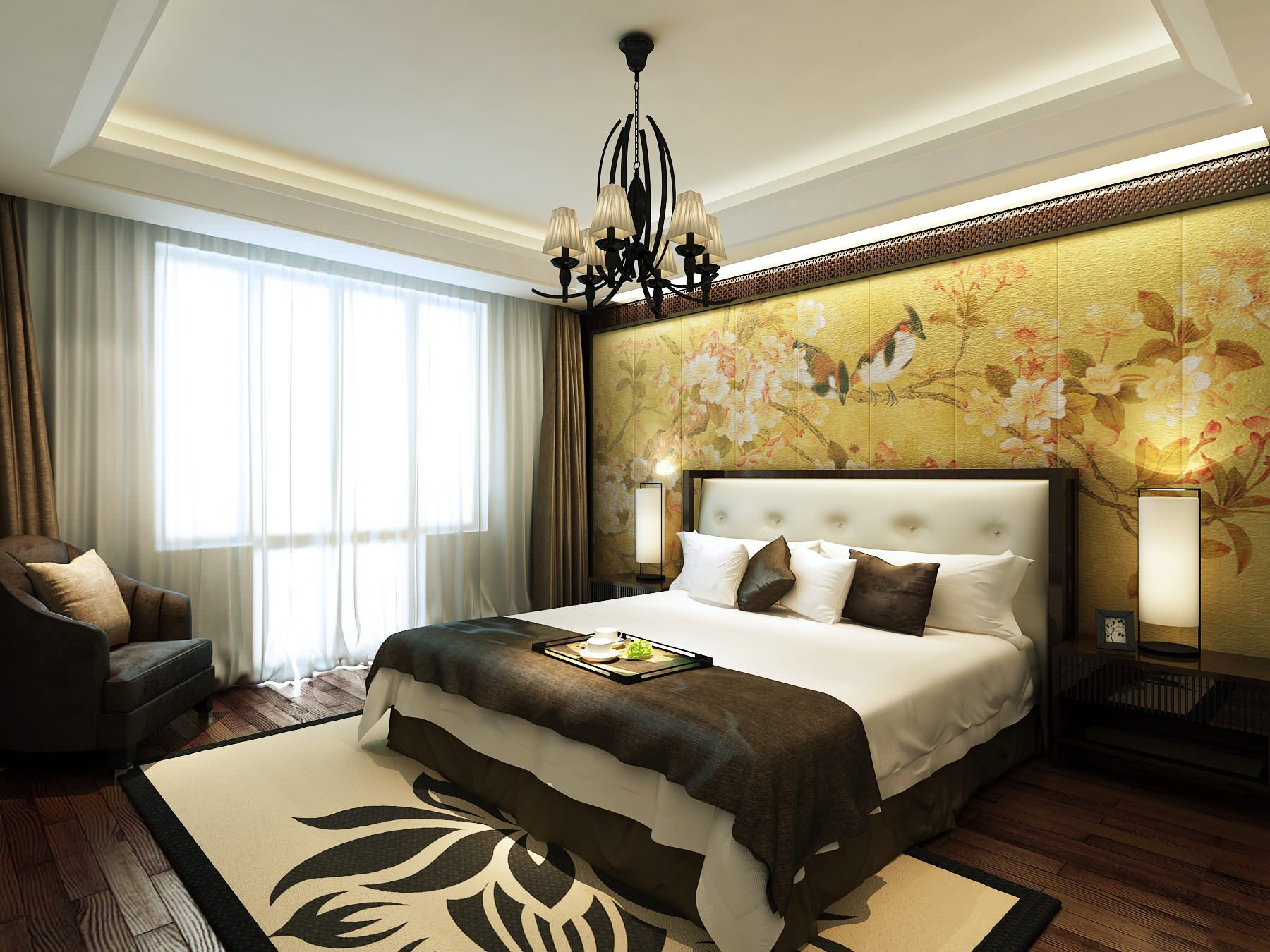
The Japanese style allows you to create the most optimal conditions for relaxation and rest after a hard day's work.
The walls painted with light paint also "take root" in the interior. The indisputable advantage of this choice is the budget cost and ease of execution. And so that the finish does not look boring, screen drawings are applied in a certain style on top of the paint.
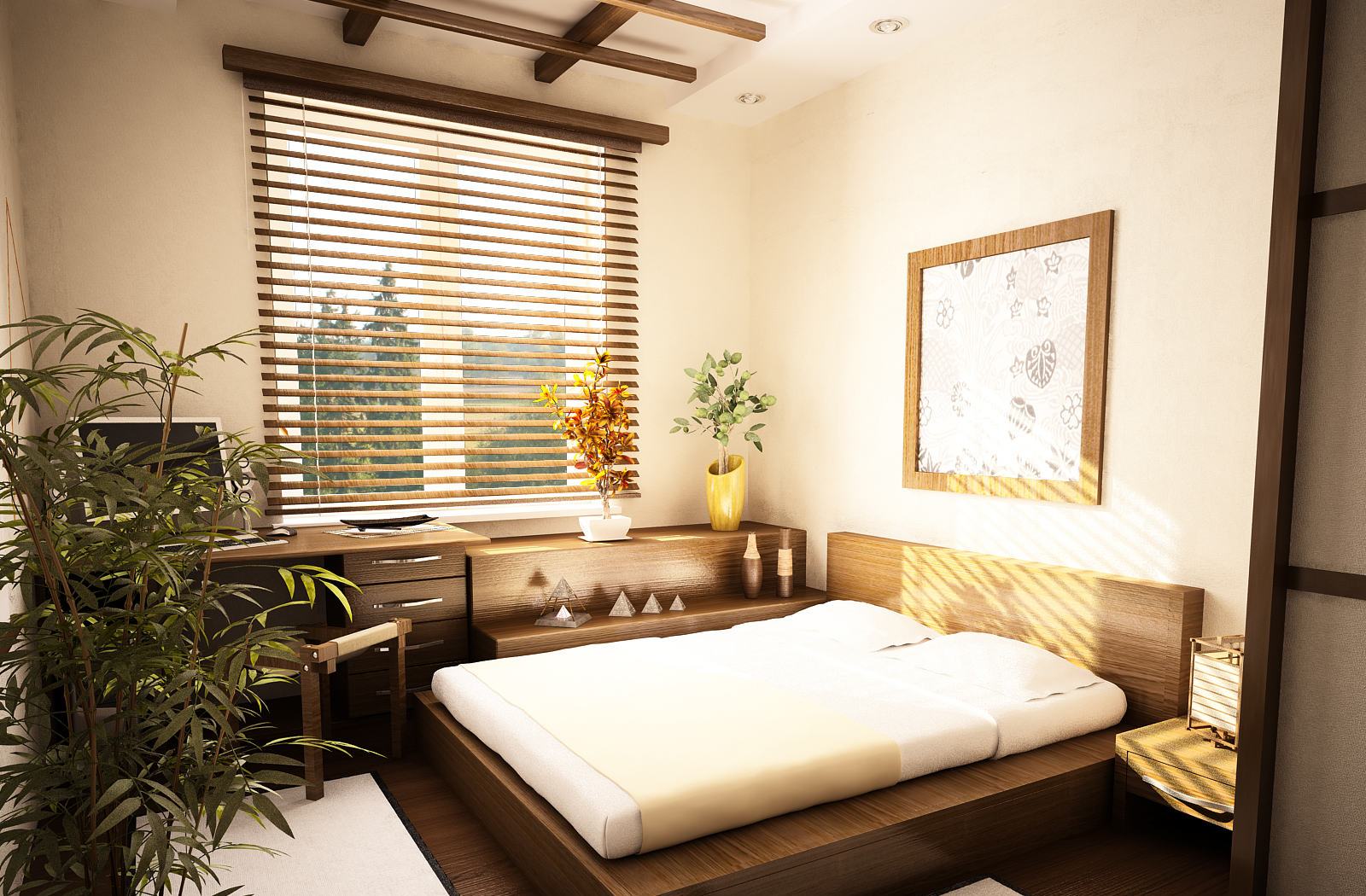
The proximity of man to nature is strongly emphasized with the help of natural materials used in the decoration and interior design.
Floor
It just seems that what is under your feet does not really matter. In Japanese interiors, flooring is perhaps the most important element. It is he who sets the general tone for the entire interior. It is impossible to imagine a traditional Japanese floor without parquet or bamboo laminate. The natural “wooden” color creates a special atmosphere of peace and comfort. Moreover, in Japan it is customary to walk around the house barefoot.
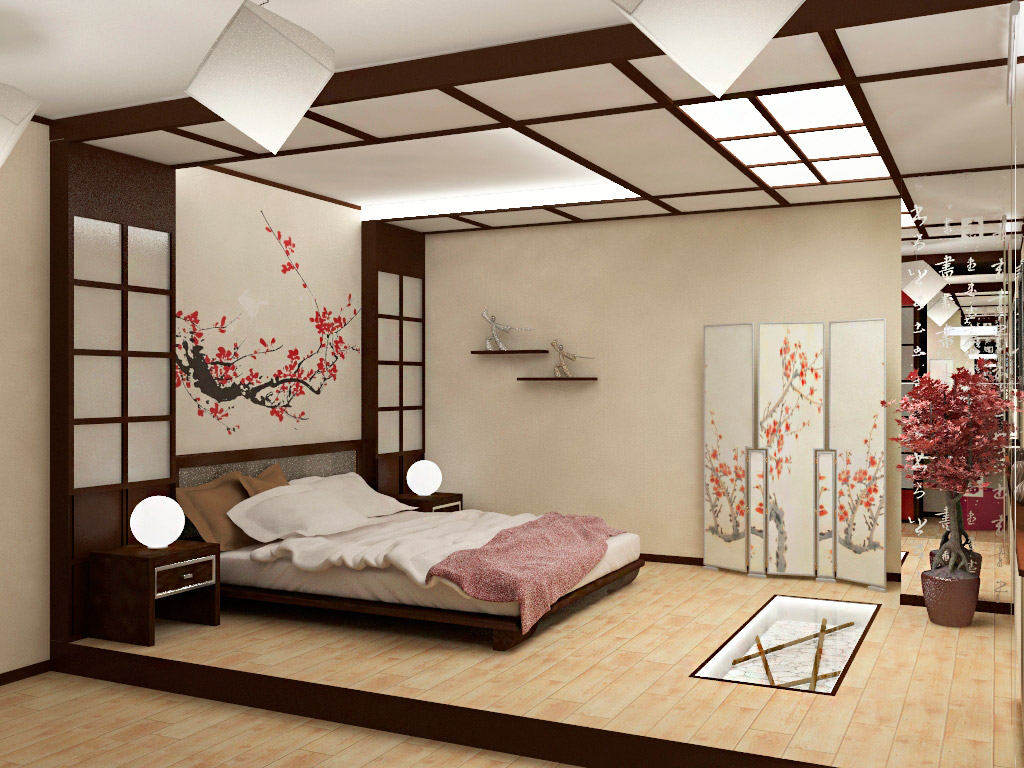
The color scheme should also be close to natural (brown, beige, dark red).
In fairness, it is worth noting that the variety of modern finishing materials provides a sufficient selection of options. For example, in a Japanese-style bedroom, tiles or marble look good on the floor. The main thing is not to make a mistake in choosing a color.
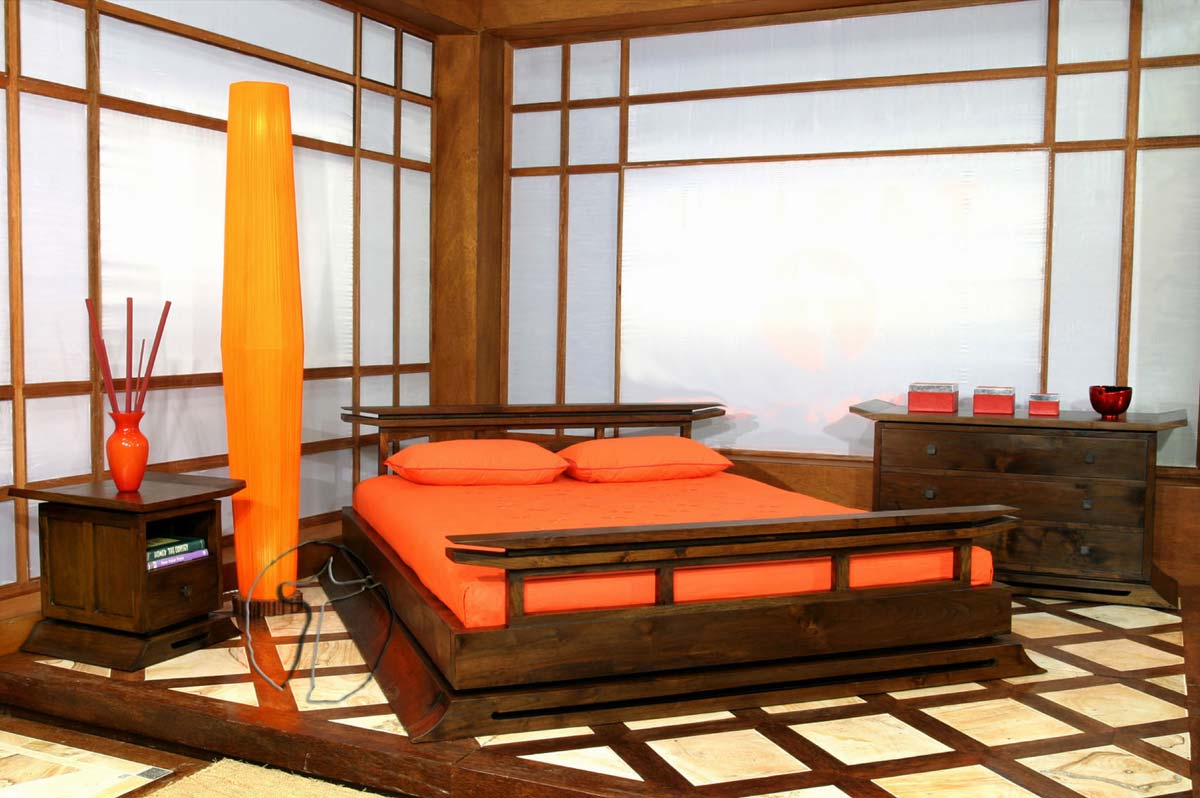
Proper arrangement of furniture, shelves, cabinets allows you to perfectly place all the necessary things and save a lot of free space.
An interesting detail: the floor in Japanese traditions does not tolerate additional carpets and coverings, but a slight exception is made for the bedroom. A bedside mat with appropriate patterns or ornaments is allowed. It is better if it is a mat made of bamboo, matting or rattan fabric.
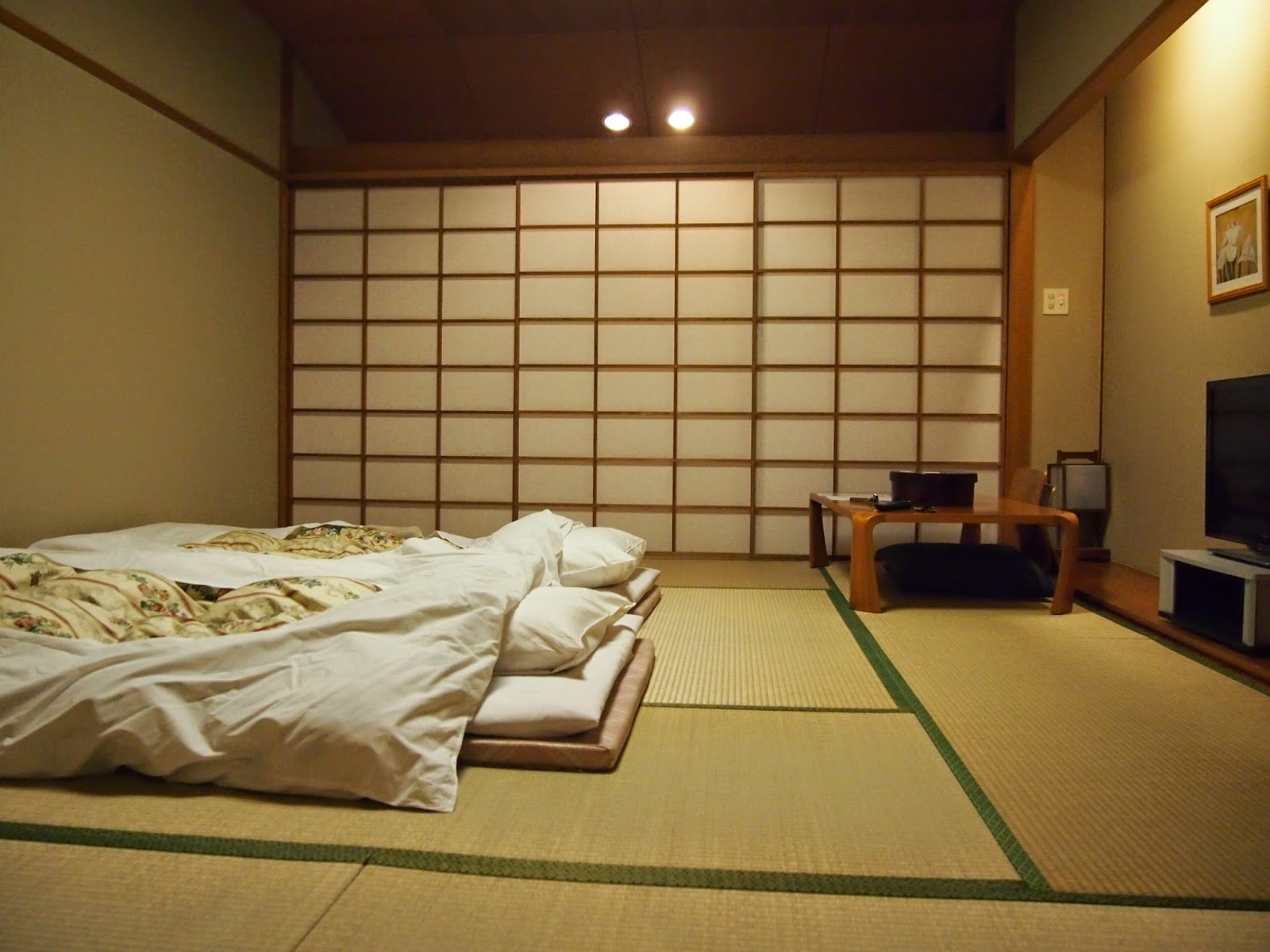
The only drawback of such natural coatings is their short service life, they wear out quickly.
Ceiling
Everything is extremely simple and concise, no arches or beveled corners. The ceiling should have a strictly rectangular shape. The use of modern technology is allowed, but it is desirable that all the "know-how" were hidden under a tree or cloth.
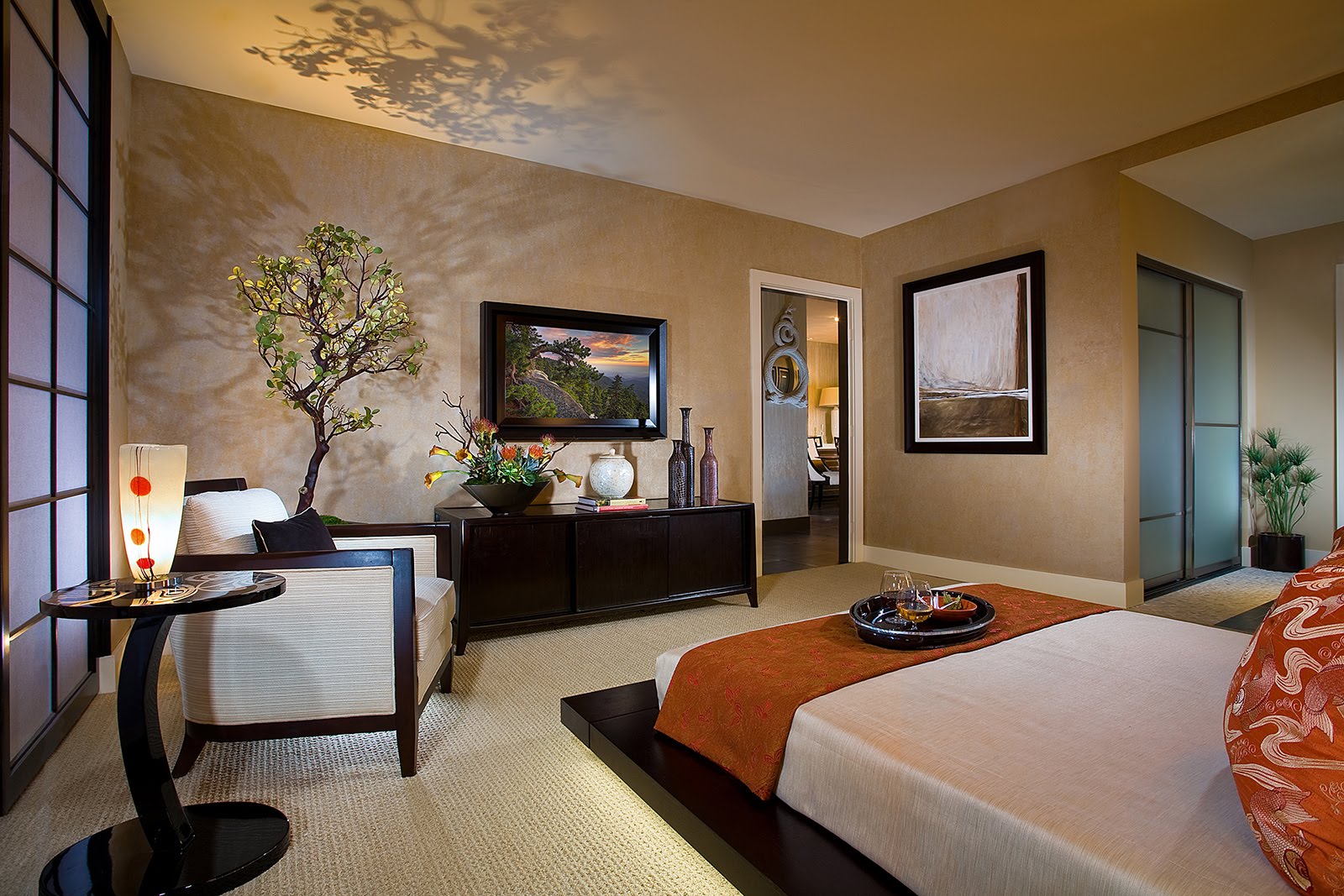
The Japanese style in the design is most suitable for people who are tired of the hectic life in the metropolis and striving for natural beauty and solitude.
The color scheme is preferably in bright colors, not bad if it will overlap with the shade of the walls. Unobtrusive drawings are allowed.
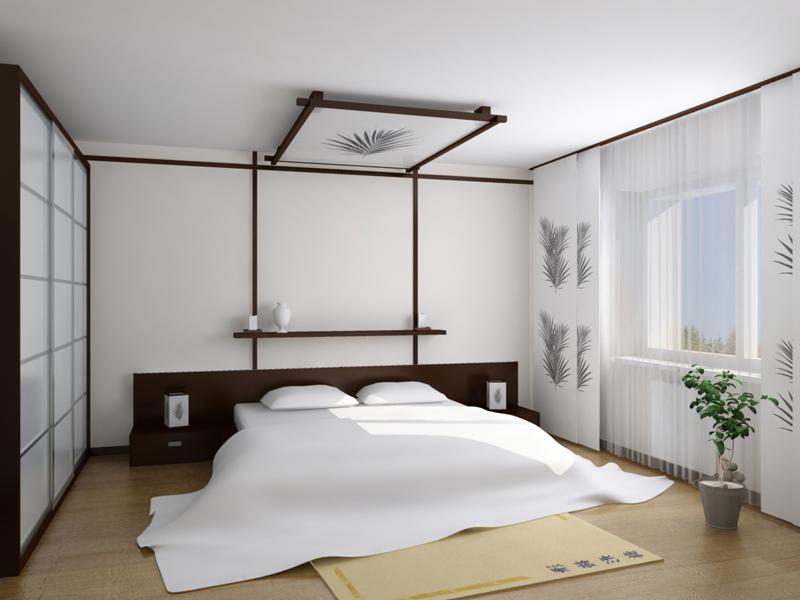
Such a style in the interior of the bedroom is recommended for connoisseurs of concise, simple design solutions.
The beam ceiling is especially stylish. To do this, first, the ceiling is painted, and then the beams are mounted on it so that intersecting, they form squares or rectangles. Or, on the contrary, the beams are first attached, and then the space is pasted over with paper wallpaper or covered with a cloth.
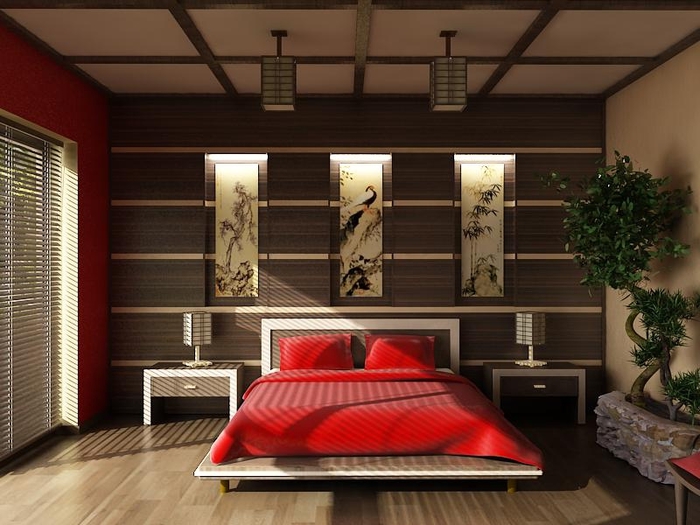
Traditional Japanese housing is very different from European living quarters. There are no heavy and massive walls.
It is better if the ceiling sections are large, then this will visually make the room larger. The brighter the contrast, the more interesting the room will look.
In addition to traditional beams, a suspended or suspended ceiling can be used.
Window
For the general design concept, blinds of an unusual form are used, fabric strips with weighting agents at the ends that move along a special ledge.
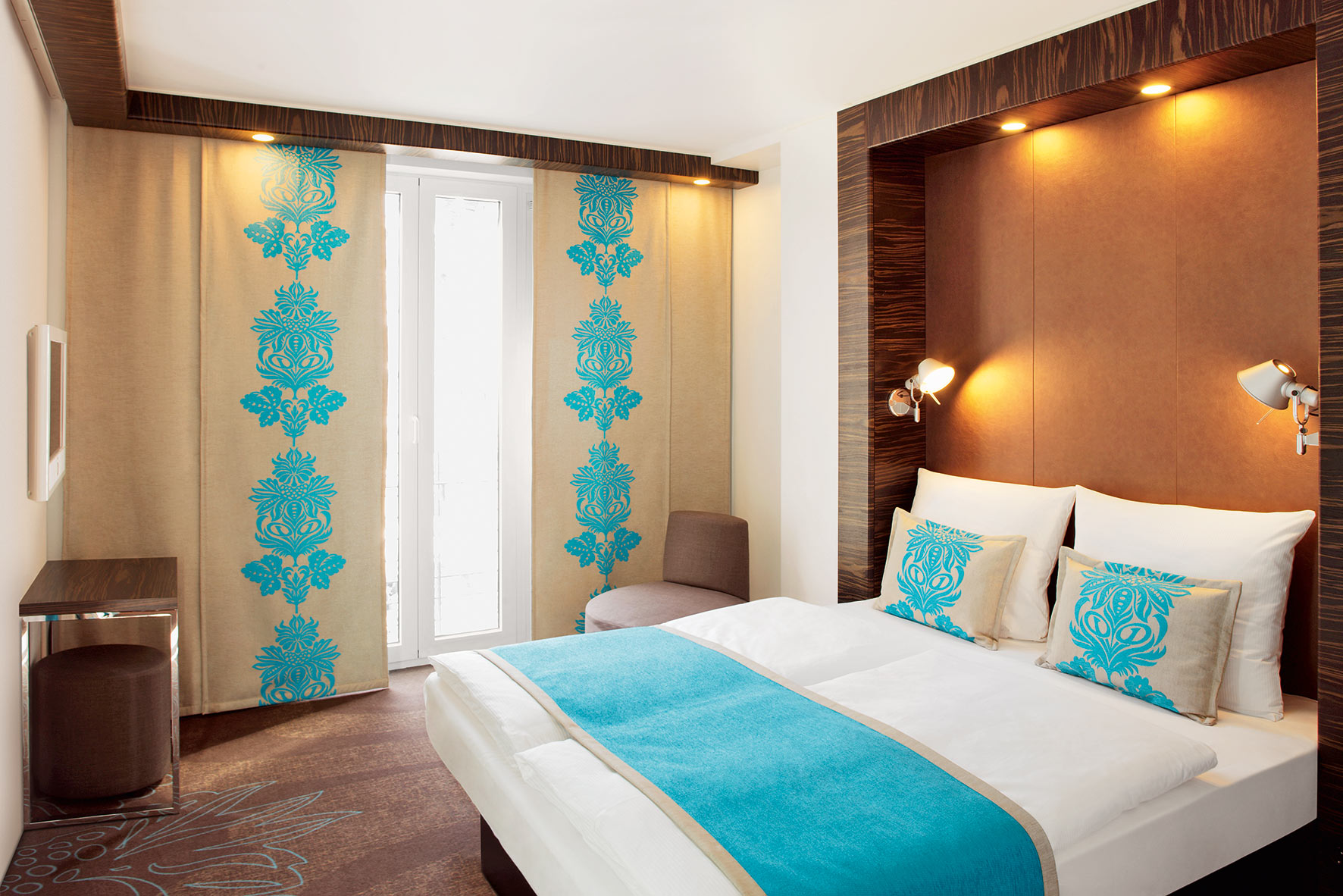
There may be a paper version, decorated with Japanese characters or traditional ornaments.
A worthy alternative would be traditional curtains made of linen or cotton. It is better to choose a plain fabric, although canvases with characteristic patterns and ornaments also look appropriate. Also, the Japanese style is well complemented by jute or bamboo curtains.
Doors
Another special interior detail. Japanese doors are absolutely silent (you won’t be able to slam the door!) And the special design is sliding. With their help, they not only emphasize the oriental style, but also save space. In the original, such doors consist of a wooden frame studded with slats in such a way that squares are obtained, on top of which the main part is made of cherry wood or walnut.
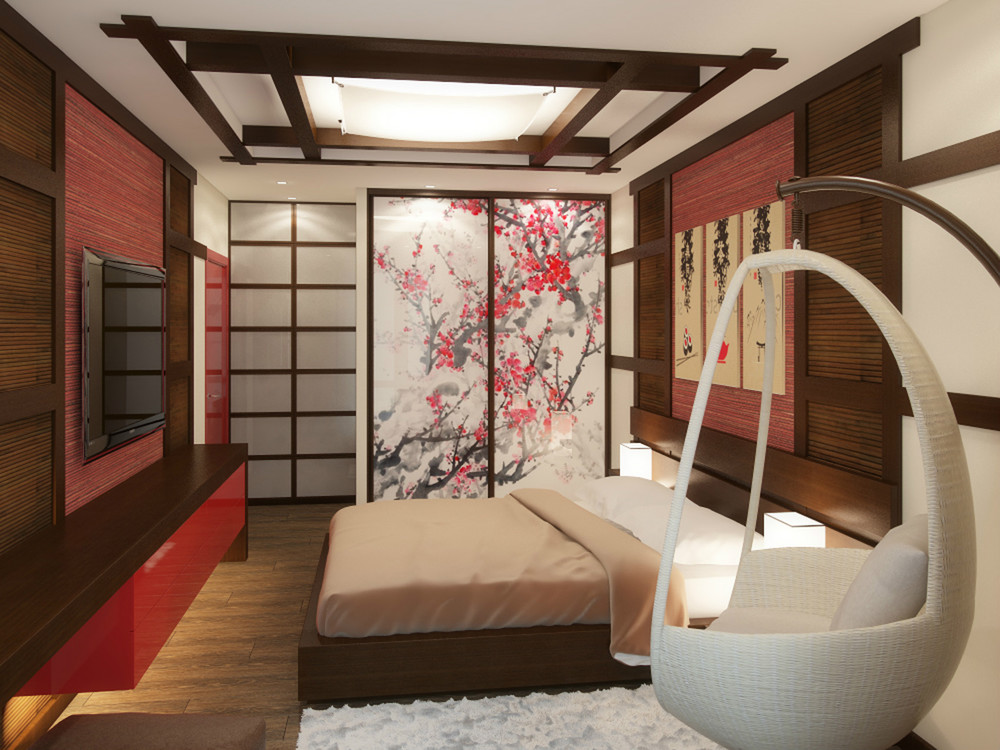
This design is very similar to the traditional Japanese sliding partitions.
If it is not possible to mount sliding doors, install folding structures - this is a more modern analogue of traditional Japanese doors.
Shine
When deciding on the placement of fixtures, an important nuance should be taken into account: the Japanese style is photophilous, but does not tolerate excessively bright lighting. Beating rays should be avoided. Prefer table lamps and sconces with paper lampshades, recessed lights and a chandelier with a dark shade.
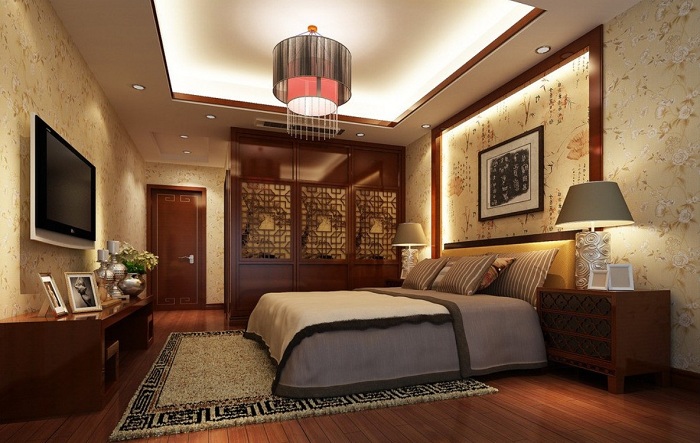
The bedroom should be well lit. In the afternoon - with the help of natural light, in the evening stylized lamps will come to the rescue.
By the way, light sources are allowed in different sizes and shapes, there is only one requirement - the absence of bright rays.
Decor
The conciseness of the Japanese style does not at all preclude the presence of decorative details; the main thing is to choose them correctly. These elements will emphasize the commitment to a particular style and give a special charm.
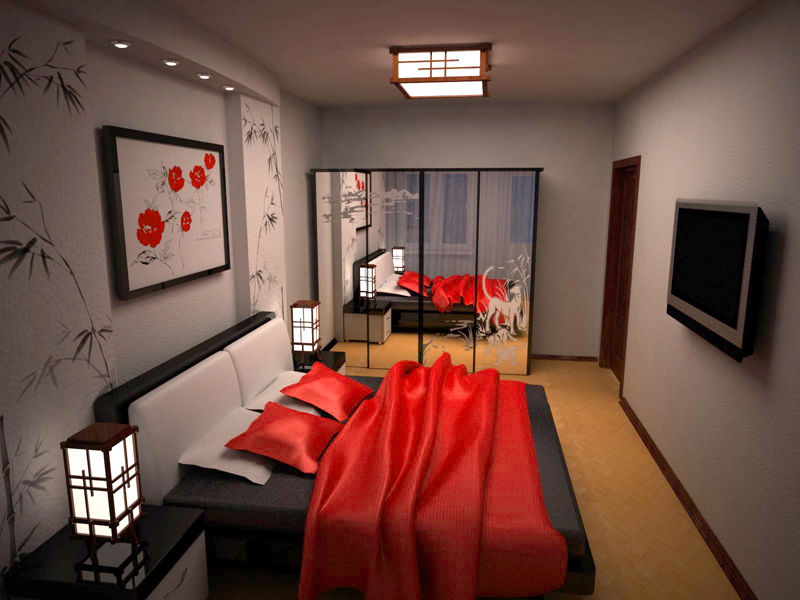
Since the main idea that goes through everything that is connected with the oriental style is minimalism, there should be few accessories and decorations in the interior.
Bonsai, fans (moreover, it is better to choose large sizes with the corresponding pattern), ikebana (as they say, small to large), as well as traditional figurines and dolls in national costumes, become permanent “inhabitants” of such rooms. Floor vases and paintings look spectacular, the main thing is not to hang several paintings on one wall, this is considered bad form.
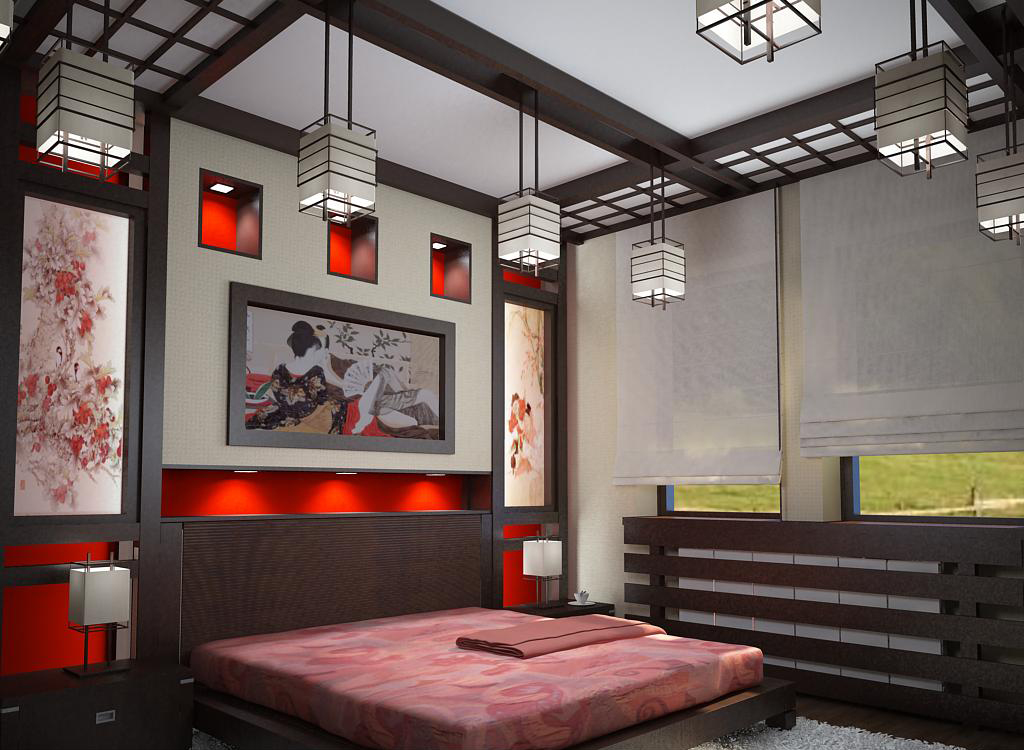
Each of the decor elements should give the interior expressiveness and sophistication.
As a decor, you can use a collection of Japanese dishes or weapons. It is important that these objects are correctly located, do not interfere with anyone and emphasize the oriental flavor.
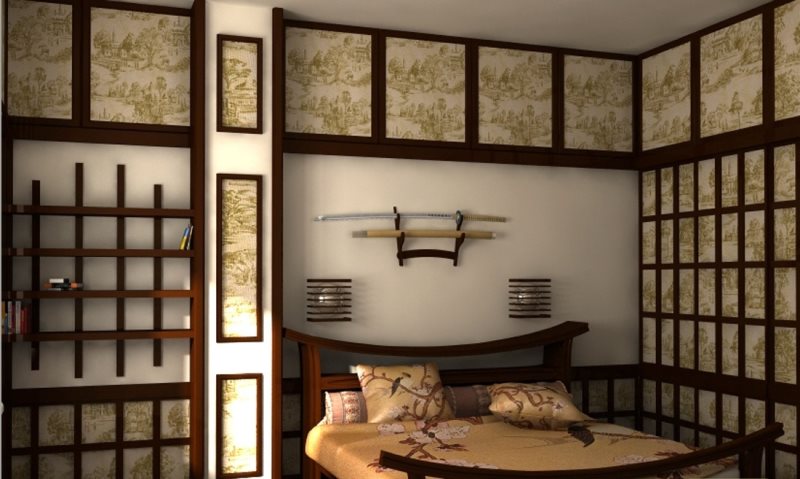
Samurai swords and huge fans hanging on the walls may also be present.
Hieroglyphs look very stylish: both as separate images, and applied to some objects. But it’s better to first clarify what exactly this or that hieroglyph means, before decorating the bedroom with such a decor.
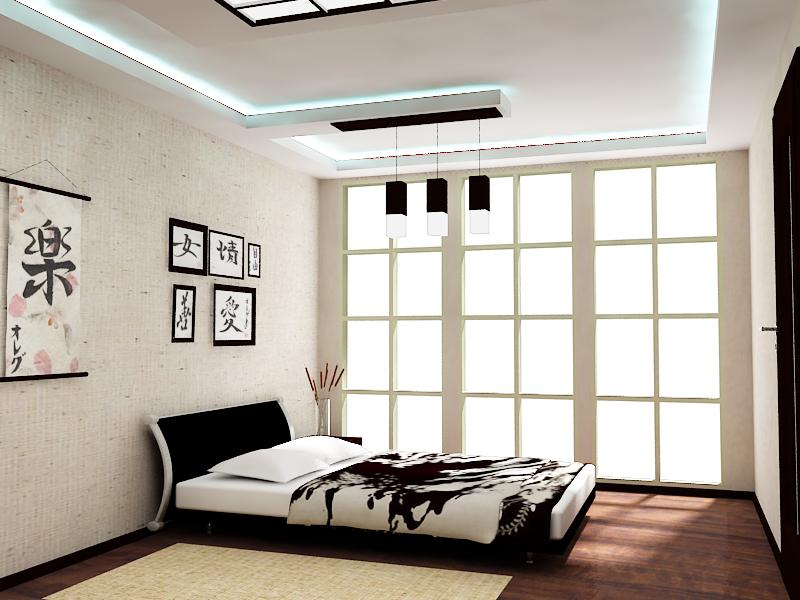
Near the bed you can put a beautifully shaped floor vase.
If the area allows, install a small fountain. Such an element will not only complement the design decision, but will also create a peaceful atmosphere in the bedroom. Well, if your room is modest in size, you will have to be content with a traditional vase surrounded by stones or a dwarf plant.
Finally, what is a bedroom without oriental incense? Make sure that scented candles have a decent stand, stylish and comfortable.
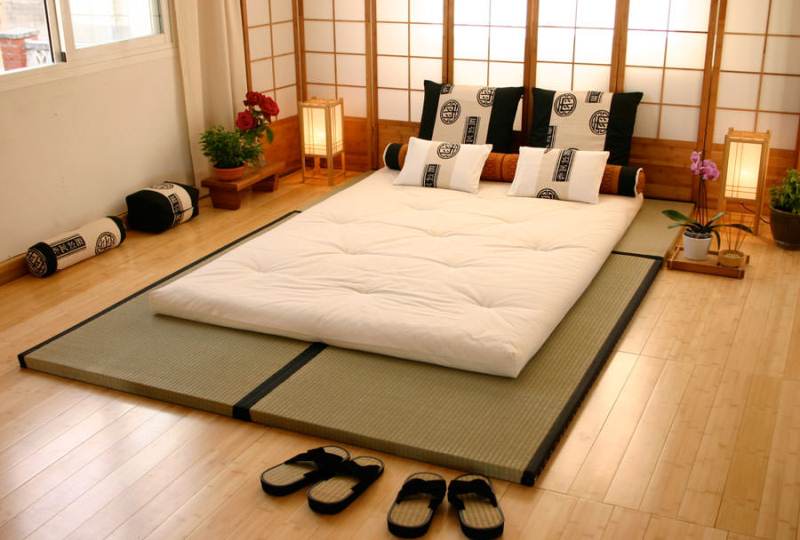
A special place in the interior is occupied by floral arrangements and plants.
As you can see, it is possible to create a tiny corner of Japan even in an ordinary apartment. However, this will require not only changing the interior, but also changing something in the mind. And even if at first such a style seems unusual, believe me, over time you will appreciate both the convenience and functionality of oriental interiors.
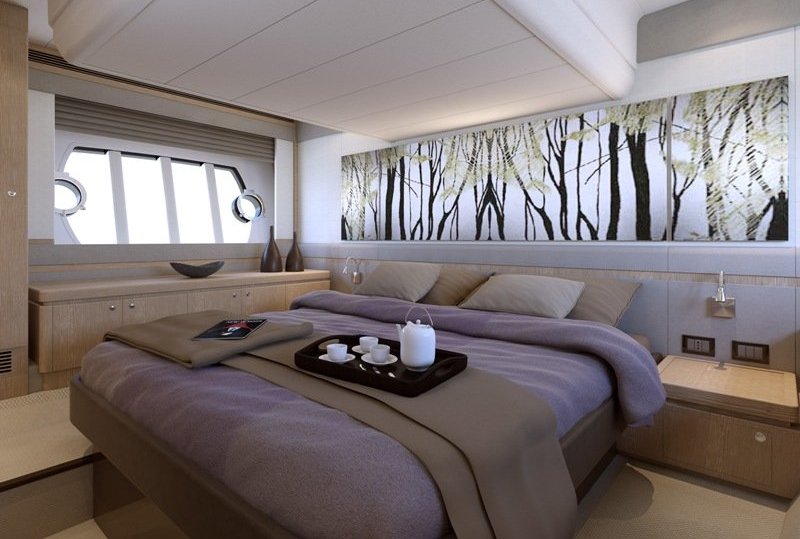
The Japanese-style bedroom is a great opportunity to be in harmony with yourself and nature.
VIDEO: Japanese-style bedroom.
